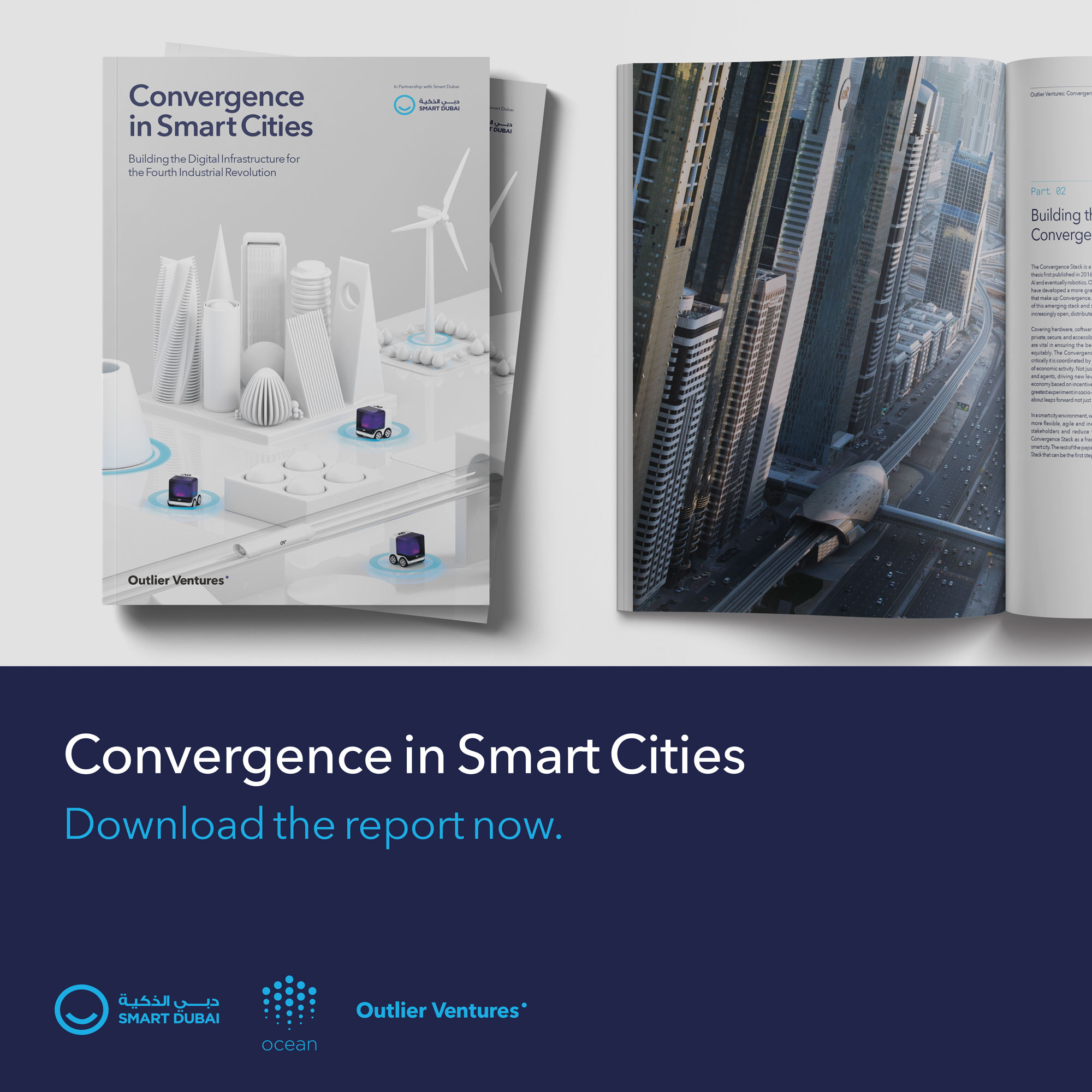These marketplaces are made possible because of the technologies lower in stack from hardware, distribution, routing, verification, and interfacing. To learn more about the Convergence Stack, a valuable framework for understanding and building the next phase of digital infrastructure in cities, download the paper here.
Decentralised Data Marketplaces
Without a free flow of data, there cannot be cross-collaboration between companies, residents, governmental bodies and entrepreneurs. Innovation cannot flourish and current data silos cause asymmetric advantages, fragmentation and work against the ecosystem-wide trust needed for innovation at scale. Many cities are already working on open data frameworks including Dubai, London, San Diego, and San Francisco. These are powerful initiatives, but they can be supercharged when combined with decentralised technologies. Making data exchanges decentralised unleashes a wave of permissionless services, and business model innovation that isn’t possible when a single company or administration controls the exchange and network.
Four specific types of new decentralised marketplace have already emerged: IoT data markets, AI data markets, personal data markets and digital assets marketplaces including crypto-assets, but also more exotic assets like non-fungible tokens (NFTs) and software bots. Let’s explore a few of them below.
Artificial Intelligence Data Marketplaces
With the emergence of deep learning as a tool for a range of applications like facial recognition and natural language processing, we now have the potential to refine data to make digital oil. In most cases, data for AI algorithms tends to be accumulated by the largest companies. Decentralised AI data marketplaces can reduce, and eventually remove, the competitive advantage of hoarding private data by enabling anybody to contribute and use data. This will dramatically increase the number of contributors and users in a more equitable digital infrastructure.
For a city, artificial intelligence marketplaces can be a powerful tool. The single biggest challenge for all but a handful of Internet giants is the difficulty in accessing enough high-quality data to feed AI algorithms. This lack of access and ability to acquire the data, has already led to winner-take-all dynamics in a few technology areas like search, social media and e-commerce. As artificial intelligence follows software by ‘eating the world’, almost every product regardless of the market – healthcare, education, transportation, e-government services – will be infused with the powers of AI.

The challenge for cities is being able to foster a competitive environment for the delivery of services. Scenarios in which services are delivered by just a few market winners are sub-optimal. It is plurality and variety of supply that citizen needs and innovation potential will be balanced with business interests. A decentralised marketplace where data can be bought and sold and, with the right incentives, provided by crypto-tokens, can give service providers access to more data and at the same time enable citizens, organisations, and all sorts of bodies to monetise data. Smaller vehicle fleet operators, for example, can train their autonomous vehicles and level the field of competition with Waymo and Tesla.
Fetch.AI is solving the aforementioned problems by using machine learning and AI to enable people make use of their data. Digital entities, called Autonomous Economic Agents, can act independently on users’ data to solve problems, transact and represent themselves, services, devices or individuals.
Personal Data Marketplaces
After peer-to-peer payments, control of personal data has been one of the most talked about applications for blockchains. This is related to but separate from self-sovereign identity, in the sense that once an individual controls their own identity, they can choose who can have access to it. This choice puts the individual in the position of the seller and the party who wants access to the data as the buyer.
Current data silos that gather data by providing “free” products have control over users’ data, especially the ones that are saved in data centers outside the reach of the General Data Protection Regulation (GDPR). Users are unable to own, control or monetise their data which results in an unfair economic transaction. With personal data marketplaces, smart city goods and services providers are incentivised to follow best practices in regards to privacy, security similar or equal to GDPR. If they fail to do so as well as provide the best service, citizens could just opt out from sharing their data. This leads to a citizen-centric ecosystem which is the essence of a smart city. Residents can monetise data gathered from interacting with e-government services, their smart energy use or their lifestyle habits and profit while choosing who, how and when their data is sold.
Wibson has launched a blockchain-powered decentralised data marketplace that enables individuals to securely sell validated personal information in a trusted environment. Users can use Wibson’s iOS and Android apps to connect to data sources such as their social media, mobile device location and other sources; they are then able to sell their data and get rewarded accordingly.
IoT Data Marketplaces
IoT data is already being captured and collected in vast quantities by sensors on infrastructure, vehicles, and user devices, but the sprawl of devices has created a fragmented ecosystem. On the consumer side, operating system providers like Apple, Google, and Amazon are attempting to leverage their dominant position in smartphones and retail to sell increasing numbers of devices to collect more data.
As we saw, IoT devices can be owned by several parties in the smart city ecosystem that might not share the same incentives, goals and ambitions. Fragmented data collection from IoT devices in combination with misaligned business models results in poor collaboration, innovation and user experience for residents. IoT data marketplaces incentivise constituents including smart building owners, federal and local governments, autonomous vehicles fleet operators and citizens to share and exchange their data on those marketplaces. More entrepreneurs and companies can provide value which is driven by healthy competition and in turn, increases the overall value of the smart city.
Decentralised data exchanges will unlock value from data. We now need to put a real value on it to drive a sustainable and equitable data ecosystem. Download the paper here to understand more:

This article is for information purposes only and does not constitute investment advice. This article does not amount to an invitation or inducement to buy or sell an investment nor does it solicit any such offer or invitation in any jurisdiction.
In all cases, readers should conduct their own investigation and analysis of the data in the article. All statements of opinion and/or belief contained in this article and all views expressed and all projections, forecasts or statements relating to expectations regarding future events represent Outlier Ventures Operation Limited own assessment and interpretation of information available as at the date of this article.
No responsibility or liability is accepted by Outlier Ventures Operations Limited or Sapia Partners LLP for reliance on the contents of this article.
Outlier Ventures is an Appointed Representative of Sapia Partners LLP, a firm authorised and regulated by the Financial Conduct Authority (FCA).

